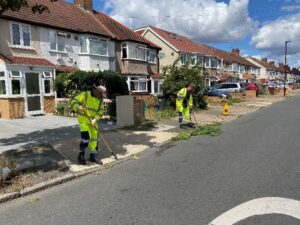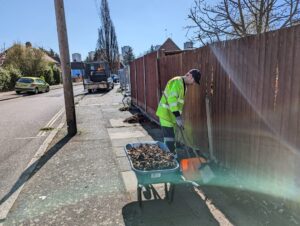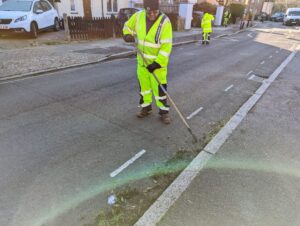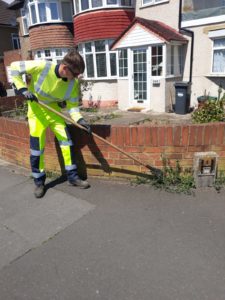Weeds on the network
Hounslow Highways delivers a dedicated weed removal service, on behalf of the London Borough of Hounslow.
Until recently, these weeds were cleared using a chemical called glyphosate, however as part of our commitment to being the greenest and cleanest borough in London and to promote biodiversity and encourage wildlife, the use of this chemical to treat the weeds in Hounslow was stopped.
In line with good environmental practice, we now clear all weeds manually without the use of chemical treatments, with the exception of invasive weeds such as Japanese Knotweed and Mares Tail, which are very damaging to the environment and still need to be controlled with chemicals.
The updated weed removal service has been refreshed for 2023. We have a programme highlighting which roads are going to be visited and when. The current Weeding Programme incorporates roads that are affected most by weeds.
Further improvements to last years’ service include:
- Dedicated teams to focus on just this service.
- Programme and FAQs published on the Hounslow Highways and London Borough of Hounslow websites.
- Updates to the programme provided on a monthly basis to keep our residents informed.
- Programme for 2023 starts earlier in the year and will extend into early November.
- Extra teams on stand by to support the weeding teams when required, and to deal with any roads that require treatment, that are not on the current programme.
- Main roads and high profile areas will be treated by the mechanical sweepers throughout the programme.
- Ward based street cleansing crews carry out small scale weed removal as part of their normal cleansing activities. So, even if your road is not on the Weeding Programme, it does not mean it will not have any weed removal treatment.
- A shorter Deep Cleanse Programme will run alongside the Weed Removal Programme on roads that require road closures due to parking issues.
- We are continuing to review alternative weed removal methods including greener and more carbon efficient equipment.
It must be noted that manually removing weeds takes longer and requires additional time to complete each route effectively. Additional repeat visits may also be required to address regrowth.
The weed-clearing programme ensures all footways, footpaths and carriageways (pavements and roads) on the public highways that are maintained by Hounslow Highways are treated. The weed programme usually runs from spring to late autumn, but is dependent on the weather, and usually corresponds with the cleansing schedule. The 2023 weeding programme has now commenced and regular updates can be viewed here Weeding Programme Update 21-09-2023
Additional dedicated teams will attend priority locations that require a faster treatment response. Outside of the weeding programme, the ward based cleansing teams will follow the standard ward based programme which can be found here (Hounslow Highways | Street Cleansing).
We ask that residents wait for the programme to reach each road but if it is felt that a location needs urgent attendance then a report should be submitted via Fix my Street at FixMyStreet (hounslowhighways.org) and an officer will be arranged to inspect the location.
Additionally the improved Deep Cleanse Programme now targets more wards in each iteration, and will be a continuous programme that extends throughout the year. This means that all wards in Hounslow will receive a Deep Cleanse treatment at least once a year. Please note however, that the roads selected for a Deep Cleanse treatment are usually ones that are heavily obstructed by parked vehicles restricting the ward based cleansing.





